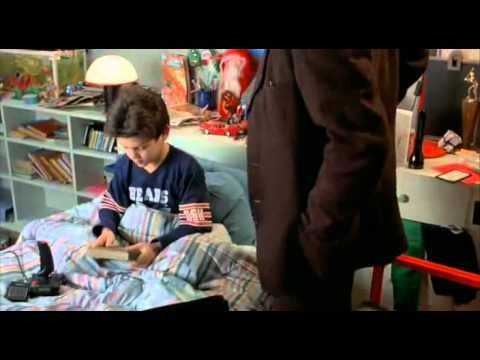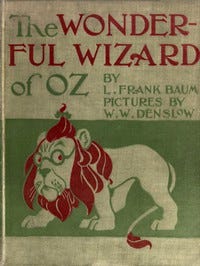For the full book and commentary, click here.
Folklore, legends, myths and fairy tales have followed childhood through the ages, for every healthy youngster has a wholesome and instinctive love for stories fantastic, marvelous and manifestly unreal. The winged fairies of Grimm and Andersen have brought more happiness to childish hearts than all other human creations.
Yet the old time fairy tale, having served for generations, may now be classed as “historical” in the children’s library; for the time has come for a series of newer “wonder tales” in which the stereotyped genie, dwarf and fairy are eliminated, together with all the horrible and blood-curdling incidents devised by their authors to point a fearsome moral to each tale. Modern education includes morality; therefore the modern child seeks only entertainment in its wonder tales and gladly dispenses with all disagreeable incident.
Having this thought in mind, the story of “The Wonderful Wizard of Oz” was written solely to please children of today. It aspires to being a modernized fairy tale, in which the wonderment and joy are retained and the heartaches and nightmares are left out.
L. Frank Baum
Chicago, April, 1900.
A Pandemonium Tale?
I change no word of the story. I am simply printing Baum's masterpiece so that we may remind ourselves of his delightfully and cleverly presented adventure. While doing so, I plan to point out the great many parallels to this moment in time. I do hope that you enjoy them. The introduction is already a work of art, sidestepping the horrors of the Prussian education model that had come to grip America.
Baum promises that he only intends to please those of the extended childhood, who have already learned their moral lessons—cargo cult style? So…wonderful…there's no moral to the story to have to think through or dwell on…this will only be entertaining…






hey man, give Baum a little credit. He is literally singlehandedly responsible for inventing "good" witches in stories. Previously, witches were always evil old hags (in English-language literature). In addition, after he became quite famous (and rich), the guy still published a new book every single year. Why? Because so many kids wrote to him and he felt obliged to give them another fun story they could enjoy. Guy must've written ten thousand letters (by hand!) to kids over his lifetime.
I'm not sure I actually ever read the Wizard of Oz (although I've, of course, seen it multiple times, including some amazing stage productions). I've thought of it too this past 1 1/2 years, in terms of little man behind the curtain, who only has power because we give it to him.
I also now must re-watch the Princess Bride!